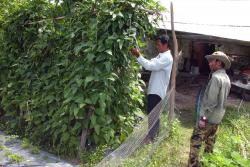Harvesting environmental data with an app
Phnom Penh: By Milei.vencel, Hungary - Own work, CC BY-SA 3.0, Cambodia has one of the most rapidly developing economies on earth. The country is moving from a rural to an industrial and urban economy at great speed, but its government is also eager to be sustainable and not to lose valuable reserves of natural resources, in its drive to develop.
New research by social and environmental scientists at ������ϲʹ�������, (Wales, UK); New York University (USA) and a Cambodian NGO, Keosothea Nou (Society for Community Development, Cambodia), one of 13 new projects funded under the ESRC Transformative research call, will provide an overall snapshot of the country’s environmental resources, and how they are used by different individuals. This information will help the government to develop sustainable policies for the energetic country.
Cambodia’s excellent mobile phone coverage is to be harnessed to engage with the population and collect the data via a mobile phone ‘app’ which has been developed for the project.
While most surveys are only able to be run as one-offs, this survey will explore at an individual level, how people interact and use the environment repeatedly every week over a whole year.
Simon Willcock, who is leading the research explains:
“We all use nature for basic ‘services’ such as providing us with food and water and other natural resources, but we also use the natural world around us for so many other purposes, from dog walking to sport and picnicking. If we focus solely on food production, for example, there is a danger that we can lose sight of other important resources, such as being able to access the land for recreation. The Cambodian Government needs to be able to manage land without bias in favour of any single activity or resource.
“We’re going to be drawing together data about who uses the natural environment, where and how, so that the country can maintain sight of all the aspects of the land as a vital resource.
 Rural farmers in Cambodia: Provided by our partners“We want to know how people view and use the natural resources around them, and how that might change with the seasons. For example, urban dwellers may use open spaces for recreation, while rural farmers may not use the environment for recreation or leisure, having spent their working day outdoors.”
Rural farmers in Cambodia: Provided by our partners“We want to know how people view and use the natural resources around them, and how that might change with the seasons. For example, urban dwellers may use open spaces for recreation, while rural farmers may not use the environment for recreation or leisure, having spent their working day outdoors.”
Publication date: 23 October 2018
